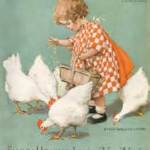I was pleasantly surprised.
Chris had etched these words on her kitchen wall:
There is nothing better for a person than that he should eat and drink and find enjoyment in his toil. This also, I saw, is from the hand of God, for apart from him who can eat or who can have enjoyment? (Ecclesiastes 2:24-25)
I remember smiling, shaking her hand, and saying, “Anyone who paints the words of Solomon on her kitchen wall is a friend of mine!”
Housekeeping, in kitchens and throughout the home, is an imperative, important task.
 Margaret Kim Peterson said it best. Peterson exemplifies what it means to do housework as a Christian.
Margaret Kim Peterson said it best. Peterson exemplifies what it means to do housework as a Christian.
I understood with a clarity that I have experienced at few other times in my life, that getting to the grocery store was one of the things that Really Mattered. . . . I measured my days by whether, at the end of them, the members of my household had been dressed and fed and bathed and put to bed. If we had been, then that was a good day. I had done what mattered most. Everything else was gravy. . . . Housekeeping—cooking, cleaning, laundry, all the large and small tasks that go into keeping a household humming along—was not a trivial matter but a serious one.
People need to eat, to sleep, to have clothes to wear; they need a place to read, a place to play, a place into which to welcome guests
and from which to welcome guests and from which to go forth into the world. These are the needs that housework exists to meet. . . . Housekeeping is not a distraction, but a beginning, and an essential one at that—in the properly Christian work of, among other things, meeting the everyday needs of others, whether those others be our fellow household members, our near neighbors, or people more sociologically or geographically distant from ourselves.
“Housekeeping is not a distraction, but a beginning . . . and an essential one at that—in the properly Christian work of, among other things, meeting the everyday needs of others”
 Chris wrote to me the other day on Facebook when I began to post about housework. She sent me this quote from C. S. Lewis to a Mrs. Ashton.
Chris wrote to me the other day on Facebook when I began to post about housework. She sent me this quote from C. S. Lewis to a Mrs. Ashton.
A housewife’s work is surely in reality the most important work in the world. What do ships, railways, miners, or cars exist for except that people may be fed, warmed, and safe in their own homes? “To be happy at home is the end of all human endeavor.” We wage war in order to have peace, we work in order to have leisure, we produce food in order to eat it. So your job is the one for which all others exist.
Go home. Shake the hand of the person–woman or man–who does housework for and with you. Thank them.
God’s rhythm, His cadence for life begins in the home.
Read through the laws of Exodus, Leviticus, and Deuteronomy. Notice again and again how important are the daily activities of life.
You see, there is no ordinary with God. He has infused life with the Extraordinary. 
Questions for Housework:
- Why do we separate work into categories?
- How do we displace the extraordinary from the ordinary in our lives?
- What should we say or do to elevate daily tasks to their rightful place in life?
- Who in our homes should we thank for their consistent practice of the ordinary?
- When do we honor the daily tasks of life?
[The most read post during the months of December 2014-January 2015 at: https://blog.emergingscholars.org/2014/12/scholars-compass-housework-is-anything-but-ordinary/]
 Mark has been teaching the phrase “vocation IS ministry” since teaching teenagers in high school. All vocations are important for the believer because God has given understanding of His world through those vocations (Is 28:23-29). Dr. Mark Eckel now shares these insights with students at Capital Seminary & Graduate School. Entries here over the next weeks are based on an adult class Mark’s pastors asked him to teach at Crossroads Community Church, Fishers, IN
Mark has been teaching the phrase “vocation IS ministry” since teaching teenagers in high school. All vocations are important for the believer because God has given understanding of His world through those vocations (Is 28:23-29). Dr. Mark Eckel now shares these insights with students at Capital Seminary & Graduate School. Entries here over the next weeks are based on an adult class Mark’s pastors asked him to teach at Crossroads Community Church, Fishers, IN


Very nice post Mark. It’s good to remind homemakers (female or male)that what they do is valuable, really crucial to a good life. Home is a haven from the world, a place to be comforted. Housework used to be referred to as the Art Of Homemaking. Do schools still have Home Economics classes, I wonder?
My mother in law, Barbara Jester, earned a bachelor’s degree in teaching in 1955, and then went on to get a Masters degree in home economics a few years later at Michigan State University. Today, she is fighting cancer and besides the normal fear of losing a loved one, the whole family recognizes the management treasure we have in her. Her meals are delicious. Her hospitality is attentive and tender. Her house is a sweet homecoming for children and grandchildren. There is precious little that this woman can’t manage between her property in Goshen, Indiana and her cottage in Michigan. Because she has so seriously interpreted her role as a calling to embrace rather than a burden to endure, both my sons and my daughters can cook, sew, clean and, generally, bless.
Cameras and microphones are poor measures of why we sell knee implants for Zimmer, assemble cars for Chrysler, suture wounds at Riley, entertain at the Indiana Repertory, spread mulch or score touchdowns. We do all these things because there are people at home who need provision. Pity the nation that shames those home managers into believing that the activity of winning that provision is somehow more important or prestigious than its domestic administration. Pity the nation twice over for especially tolerating a man who so regards his wife.
Edith Schaeffer gave me permission to express creativity by decorating my home in The Art of Homemaking. I tend to feel it is temporal and therefore not worthy of such attention. But she taught me otherwise.